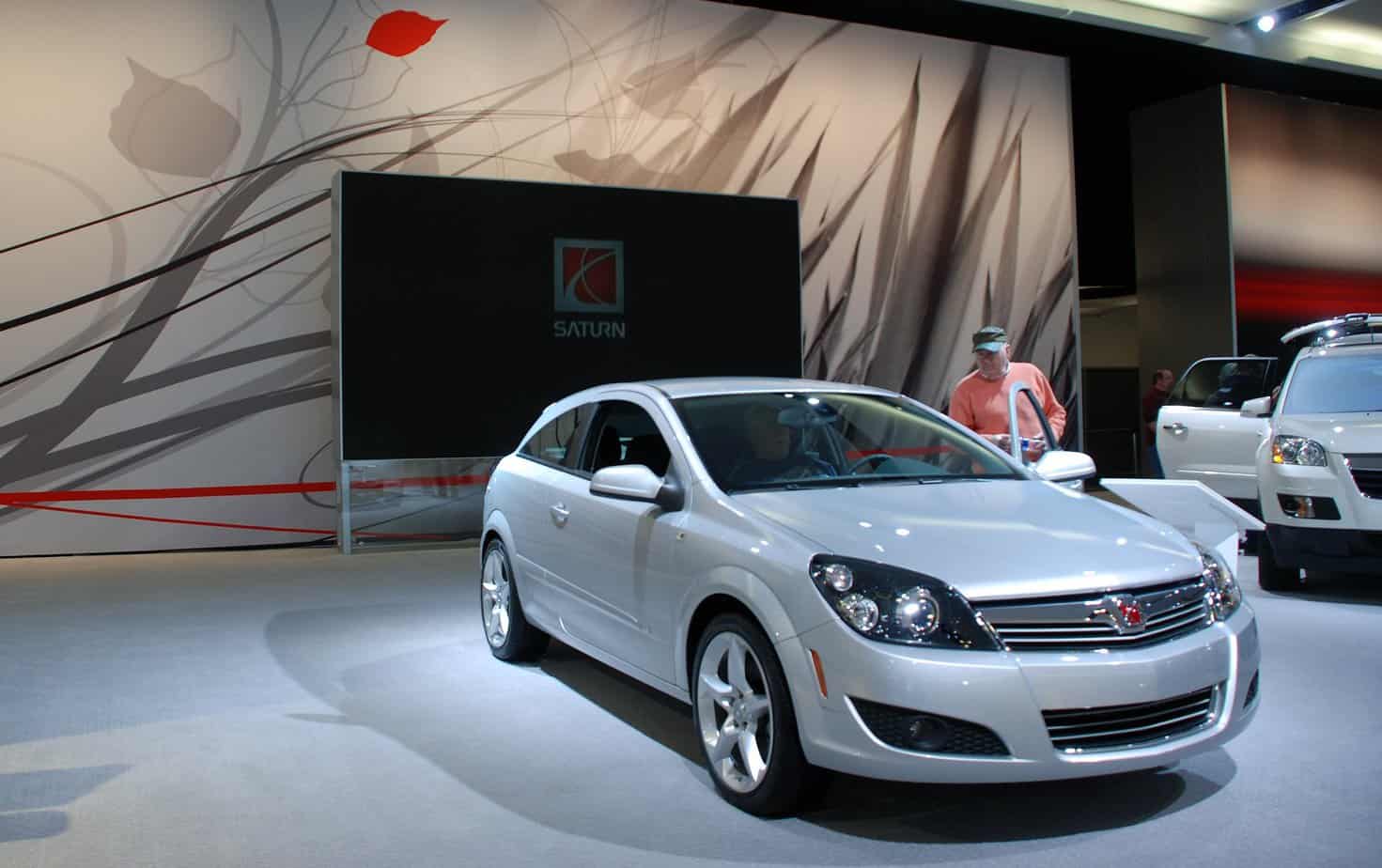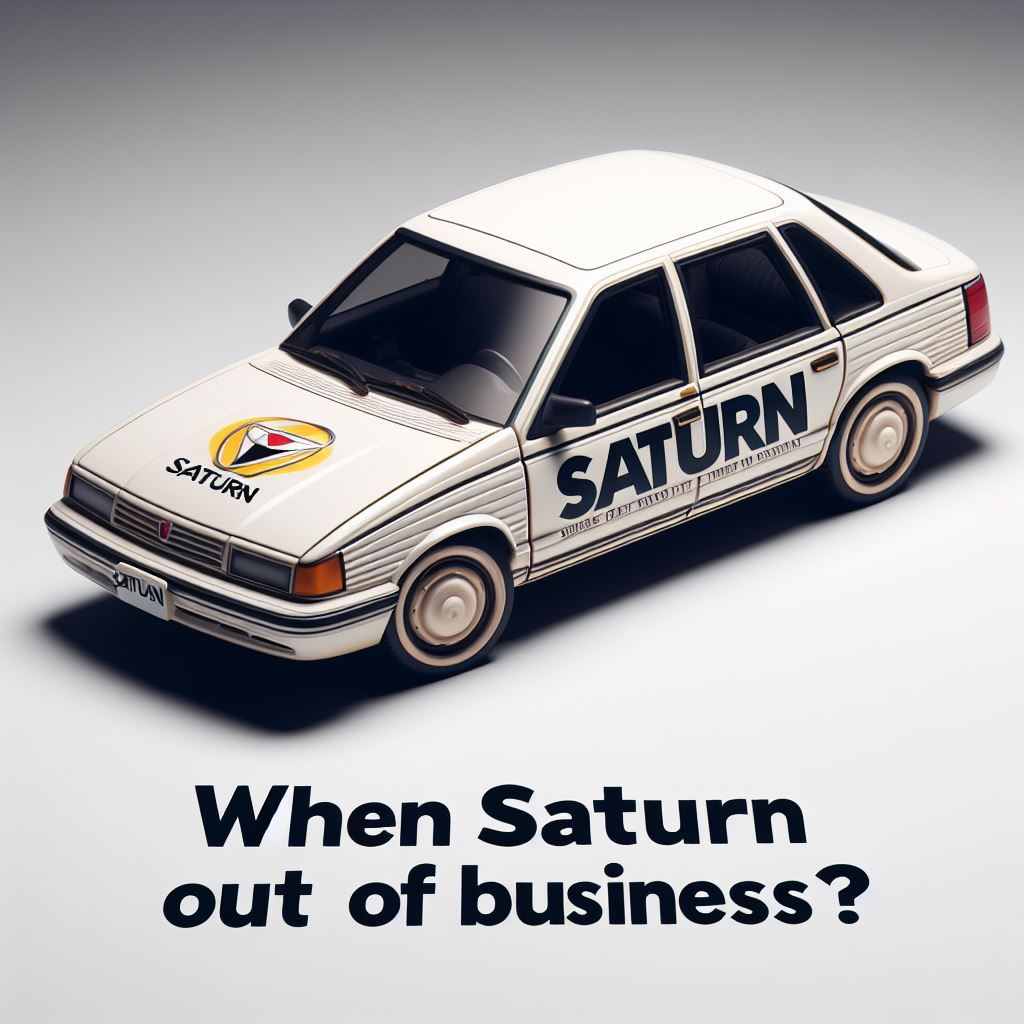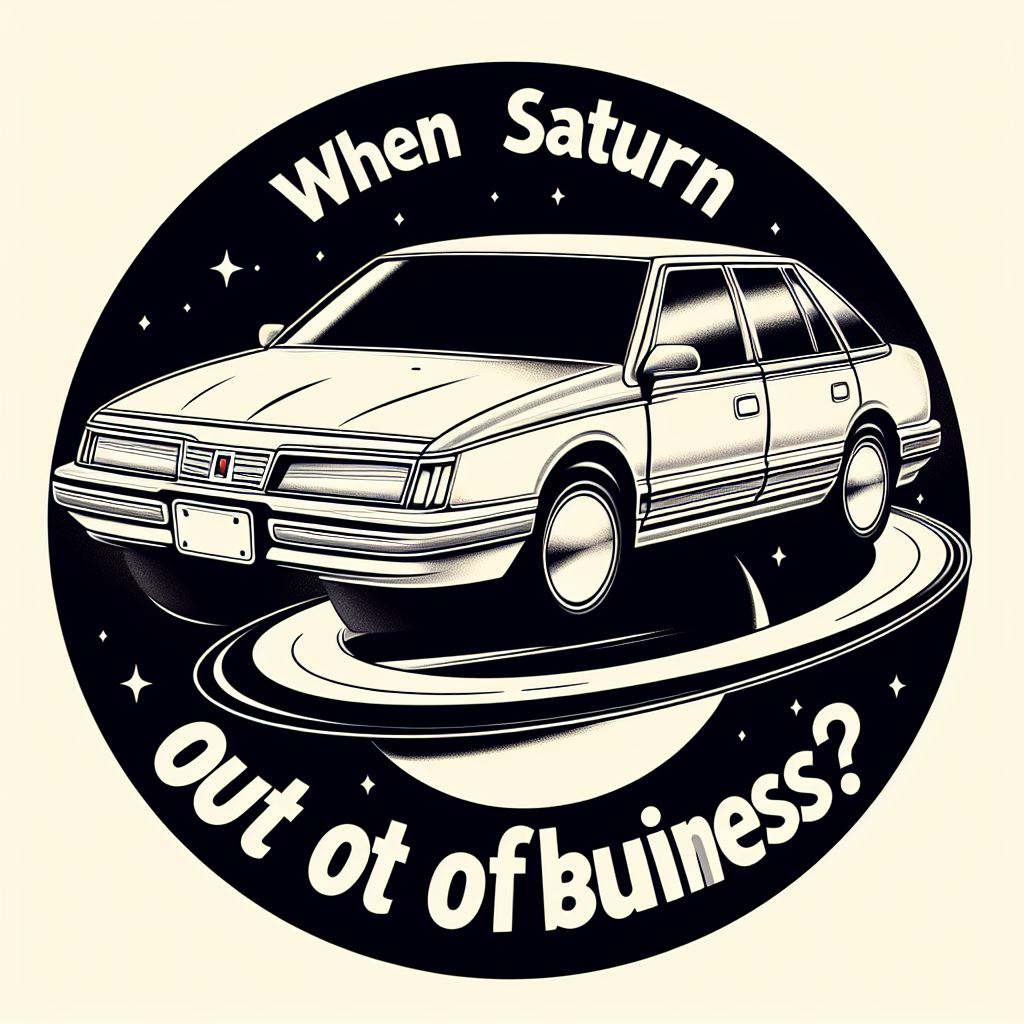Fasten your seatbelt for a thrilling journey through time as we answer when did Saturn go out of business. Join us in decoding the final rev that marked the end of Saturn’s journey in the business lane.
In the intricate tapestry of automotive history, Saturn stands out as a brand that dared to redefine the traditional car-buying experience. However, the journey of this pioneering brand took an unexpected turn, leading to its closure amidst a turbulent period in the industry. This led many people to question when did saturn go out of business and why.
Saturn’s exit was not merely a business event but the conclusion of a chapter that began in 1985 when General Motors introduced the brand. Saturn became synonymous with innovation because of its customer-centric ethos and unconventional retail strategies. Yet, as the economic winds of change swept through the automotive realm during the late 2000s, the brand faced insurmountable challenges.
This article will answer when did saturn go out of business. and unravel the story behind Saturn’s rise and fall, exploring the circumstances that prompted its closure. Join us on a reflective drive down memory lane, where we reminisce about Saturn’s impact on the automotive landscape and dissect the pivotal moments that shaped its destiny. Through the rearview mirror, we’ll examine the broader industry context and bid farewell to a brand that left an enduring legacy in its wake.
When did Saturn go out of business? A complete breakdown

Have you ever wondered what happened to Saturn, the once-iconic car brand that used to roll down the streets? Well, buckle up because we’re about to take a ride through time to explore when did saturn go out of business and other details.
- The birth of Saturn
- The golden years
- Trouble on the horizon
- Financial woes at General Motors
- The beginning of the end
- Legacy lives on
The birth of Saturn:
Back in the ’80s, when neon colors and big hair were all the rage, General Motors (GM) decided to launch a brand-new car division – Saturn. It wasn’t just about selling cars; it was a whole new approach to the automotive industry. Saturn aimed to be different, innovative, and customer-focused.
The golden years:
Fast forward to the ’90s, and Saturn became the cool kid on the block. Their cars were known for their plastic body panels (no more dings and dents!), no-haggle pricing (no more awkward negotiations), and a laid-back, no-pressure buying experience. It was like a breath of fresh air in the car industry.
People loved the Saturn brand for its commitment to customer satisfaction. The “Saturn Difference” wasn’t just a marketing gimmick; it was a promise to make car buying less stressful and more enjoyable.
Trouble on the horizon:
However, as the 2000s rolled in, so did some storm clouds for Saturn. The brand faced challenges in keeping up with rapidly changing market demands. While Saturn cars were popular for their customer-centric approach, the models themselves struggled to compete in terms of design, performance, and features compared to other brands.
Saturn’s lineup became a bit stale, lacking the wow factor that consumers were increasingly looking for. As the automotive landscape evolved, Saturn started to lose its shine.
Financial woes at General Motors:
To understand when did saturn go out of business and why, we have to look at the bigger picture – General Motors. In the mid-2000s, GM was facing significant financial difficulties. The company was dealing with high production costs, increased competition from foreign automakers, and changing consumer preferences. Amidst these challenges, GM had to make tough decisions to cut costs and streamline its operations. Unfortunately, Saturn found itself on the chopping block.
The beginning of the end:
In 2009, the unimaginable happened – General Motors filed for bankruptcy. As a part of the restructuring process, GM had to make some tough choices about its brands. Saturn, along with Pontiac and Hummer, faced the axe.
The decision to discontinue Saturn wasn’t solely based on the brand’s performance but was a strategic move to save the sinking ship that was General Motors. It was a heartbreaking moment for Saturn enthusiasts, employees, and communities that had become synonymous with the brand.
Legacy lives on:
While Saturn as a car brand ceased to exist, its impact on the automotive industry didn’t fade away entirely. The customer-centric approach pioneered by Saturn left a lasting legacy. Many of the practices that made Saturn unique, like no-haggle pricing and a focus on customer satisfaction, have been adopted by other car manufacturers.
In a nutshell
In the rearview mirror of automotive history, the tale of Saturn is a bittersweet reminder of the dynamic nature of the industry. What began as a bold experiment in redefining the car-buying experience ultimately succumbed to the complexities of the automotive landscape and the challenges faced by its parent company, General Motors.
While Saturn cars may no longer cruise down our streets, the essence of innovation and customer-centric values it brought to the forefront lives on. The no-haggle pricing and commitment to customer satisfaction pioneered by Saturn continue to influence how car manufacturers engage with consumers today.
As we reflect on when did saturn go out of business and the entire journey of Saturn, we realize it’s not just a story of closure but also a narrative of enduring impact. The spirit that fueled Saturn’s unique approach continues to shape the automotive world, reminding us that even in the face of challenges, the legacy of innovation can spark change
Unraveling the Saturn saga: A closer look at today’s landscape

Let’s take a closer look and answer the following frequently asked questions:
- Who makes Saturn cars now?
- Are there any Saturn dealers left?
- Are Saturns reliable cars?
- What is the best Saturn car?
- Who makes Saturn cars now?
Who makes Saturn cars now?
In the ever-evolving world of automobiles, the fate of once-beloved car brands often takes unexpected turns. So, what about Saturn? If you’ve been wondering who holds the reins of Saturn cars today, you might be surprised to find out that they no longer roll off the assembly lines.
Saturn, as a brand, ceased to exist when General Motors discontinued it in 2009. The decision was part of GM’s restructuring efforts during its bankruptcy filing. Unfortunately, this meant the end of the road for Saturn cars.
Are there any Saturn dealers left?
Given that Saturn is no longer in production, the once-vibrant network of Saturn dealerships has largely disappeared. After the discontinuation of the brand, many Saturn dealerships either closed down or transitioned to selling other GM brands. This transition marked the end of an era for those distinctive Saturn showrooms that were once scattered across the automotive landscape.
Are Saturns reliable cars?
When it comes to reliability, Saturn cars built a reputation for being sturdy and dependable during their heyday. Saturn’s commitment to quality and customer satisfaction was reflected in the overall reliability of its vehicles. However, it’s crucial to note that the reliability of any car depends on various factors, including:
- Maintenance
- Driving conditions
- Individual models.
Since Saturn production ceased over a decade ago, finding a brand-new Saturn is not an option. However, some dedicated Saturn enthusiasts and owners may still keep their vehicles running on the roads. In such cases, the reliability of a Saturn would largely hinge on how well it has been maintained over the years.
What is the best Saturn car?
Choosing the best Saturn car is a subjective matter, as it depends on individual preferences, needs, and the intended use of the vehicle. Saturn offered a diverse lineup over the years, featuring compact cars, sedans, and SUVs. One of the notable models was the Saturn S-Series, known for its fuel efficiency and practicality.
The Saturn Vue, a compact SUV, also gained popularity for its versatility and comfortable ride. In the end, determining the “best” Saturn car would involve considering factors such as size requirements, desired features, and personal driving preferences.
Who makes Saturn cars now?
No company is actively manufacturing Saturn cars. The brand’s discontinuation in 2009 marked the end of Saturn’s presence in the automotive market. General Motors, Saturn’s parent company, shifted its focus to other brands under its umbrella.
In the years following Saturn’s closure, some of its innovative practices, such as no-haggle pricing, found their way into the broader automotive industry. While Saturn cars are no longer being produced, their impact on the automotive landscape endures in various ways.
Summary:
The story of Saturn is a fascinating journey through the rise, fall, and legacy of a brand that dared to be different. While Saturn cars may no longer grace our roads as new models, their impact on automotive practices and the memories of Saturn enthusiasts linger on. The automotive industry is a dynamic realm, and the Saturn saga serves as a reminder that even the most iconic brands can take unexpected turns on the ever-winding road of progress.
Saturn’s enduring legacy: Beyond the business exit
When we talk about the legacy of a brand, we often think of its impact during its heyday. However, Saturn, the once-innovative car brand, teaches us that a legacy can extend far beyond the years of production. We will now explore the enduring legacy of Saturn and how its influence continues reverberating even after its business exit.
- The rise and fall
- Innovative practices
- Customer-centric values
- Saturn enthusiast communities
- Technological contributions
- Environmental awareness
The rise and fall:
Saturn’s journey, from its inception in the ’80s to its exit in 2009, was marked by innovation, customer-centric values, and a unique approach to the car-buying experience. Unfortunately, financial challenges and shifting industry dynamics led General Motors to discontinue the Saturn brand. The closure of dealerships and the halt in production marked the end of an era for Saturn.
Innovative practices:
While Saturn cars may no longer roll off the assembly lines, the innovative practices introduced by the brand have become part of the automotive industry’s DNA. The concept of “no-haggle” pricing, which Saturn pioneered, has been adopted by other manufacturers, simplifying the car-buying process and reducing stress for consumers. Saturn’s influence lives on in these industry-wide practices that continue to shape how we buy cars today.
Customer-centric values:
Saturn was more than just a brand; it was a community. The commitment to customer satisfaction, transparent communication, and a no-pressure buying experience set Saturn apart. Even after its business exit, the emphasis on putting customers first has become a guiding principle for many businesses in various industries. Saturn’s legacy is not just about cars; it’s about a mindset that values the customer relationship as the cornerstone of success.
Saturn enthusiast communities:
The end of Saturn as a brand did not mark the end of the road for its enthusiasts. Dedicated communities of Saturn owners and fans continue to thrive, sharing memories, experiences, and a passion for the unique identity Saturn brought to the automotive world. These communities are a living testament to the lasting impact a brand can have on its followers.
Technological contributions:
Saturn was also a pioneer in certain technological advancements. While some features may seem commonplace now, Saturn was among the first to integrate composite plastic body panels, reducing susceptibility to dings and dents. Technological innovations introduced by Saturn have influenced the development of future vehicle models across the industry.
Environmental awareness:
Long before sustainability became a buzzword, Saturn was making strides toward environmental awareness. The brand introduced fuel-efficient models and explored alternative energy sources, setting a precedent for the automotive industry’s increasing focus on eco-friendly practices. Saturn’s early initiatives in this realm paved the way for a more environmentally conscious approach within the automotive sector.
Saturn’s impact goes way beyond the curtain call in 2009. It’s still making waves with its innovative ways that everyone’s jumped on. Customer happiness? Saturn set the trend, and it’s still the name of the game. Enthusiast hangouts? Those are still buzzing with Saturn’s love. Tech wizardry? Saturn was the original wizard.
Even though Saturn isn’t hanging out in showrooms anymore, its spirit is out there on the roads, and the principles it dropped are still steering the ship in the car world. The Saturn story is like a reminder that a brand isn’t a one-time hit during its production run. It’s a lasting groove that shapes things long after its final bow.
FAQs: When did Saturn go out of business?
What is the history of Saturn automobiles?
Saturn was a brand of automobiles created by General Motors in 1985. It aimed to compete with Japanese imports and had a unique “no-haggle” pricing strategy.
Why did Saturn go out of business?
Saturn ceased operations in 2010 due to General Motors’ financial difficulties. The decision was part of a restructuring plan, and the brand was discontinued.
Did Saturn cars have any distinctive features?
Yes, Saturn was known for its polymer-bodied panels, which were dent-resistant. The brand also emphasized a no-haggle pricing strategy and a customer-friendly approach.
Can I still buy a new Saturn car today?
No, new Saturn cars are no longer in production. The last models were manufactured in 2009, and any available inventory was sold in subsequent years.
Conclusion
Saturn’s closure in 2010 echoes a bittersweet melody of innovation and economic challenges. The brand, once a trailblazer in customer-centric strategies, navigated its final miles through a tumultuous industry landscape. Reflecting on when did Saturn go out of business, we honor its legacy—a testament to a bygone era. As we drive forward, let’s cherish the memories of Saturn, a brand that left an indelible mark on the roads it once traveled




